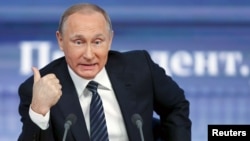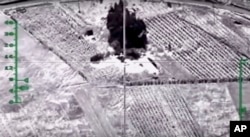President Vladimir Putin said there was little hope for improving relations with Turkey after it shot down a Russian bomber jet in November along its border with Syria.
"On the level of bilateral state relations I don't see prospects to improve ties with the current Turkish leadership,” said Putin at his annual press briefing Thursday, “but on humanitarian level — I certainly do."
Putin did not clarify what he meant by humanitarian level.
But international organizations have said that Russian air strikes, allegedly aimed at Islamic State (IS) and other terrorists, forced a halt to much-needed aid flowing from Turkey to Syria.
Putin suggested Turkey’s shooting down the SU-24 bomber may have been to gain favor with the United States.Turkey and the U.S. are both members of the NATO western military alliance.
“I don't understand why they did it. What have they achieved? Did they think that we would run away from there? Of course not. Russia is not that kind of country," said Putin during the more than three-hour event.
“[The] president’s tone with regard to Turkey was very angry,” says Moscow-based independent political analyst Maria Lipman.“He spoke in a very, I would say, derogatory fashion about the Turkish leadership.He basically made it clear that he cannot deal with the government of Turkey.And, he sounded tough and made it clear that Turkey will be punished.”
Russia retaliated last month with sanctions against Turkish imports, visas, and possible suspension of bilateral economic projects.Two major projects, a nuclear power plant and a gas pipeline through Turkey, are still possible if agreements can be made, said Putin.
Syria
Putin repeated recent claims that Russia is conducting air support for some opposition groups fighting against IS and voiced support for a U.S.-led plan that includes preparation of a U.N. Security Council resolution on Syria.“In general we agree with it; I think Syrian authorities will also agree with it when they look through the draft,” said Putin.
“Do we have a plan? Yes we do, I have just voiced it. In principle it coincides in key points - strange as it may seem - with the vision suggested by the United States."
Putin spent much of his 2014 press conference lambasting the U.S. and the West for allegedly causing the situation in Ukraine.
Lipman says Putin’s change in tone is because he is getting what he wants.“With the beginning of the Russian air strikes in Syria, what President Putin has achieved is breaking from isolation and being regarded as an important player, a party to attempt to solve the Syrian crisis,” she says.
“Whereas before, Russia’s role on the world scene it seemed was reduced to being a problem of European security.”She added, “So, now the stature of Russia is what it should be, in Putin’s eyes and in the eyes of the overwhelming majority of the Russian people.”
The Russian president refused to be drawn on a key disagreement with the U.S.-led coalition: whether Assad should leave power as part of that plan.“We think that Syrian people alone should determine who they want to rule them, under which standards and which rules,” said Putin.
He said Russia would continue the air strikes campaign as long as the Syrian Army’s offensive but questioned whether Russia needed to maintain a permanent military base in Syria.
Ukraine
For the first time, the Russian president seemed to acknowledge Russian military personal were operating in east Ukraine."We have never said that there were no people [in east Ukraine] who were involved in resolving certain issues including those of a military nature,” said Putin. He added, “But this does not mean there were regular Russian troops there. Please, understand the difference."
“It was the same thing with Crimea,” says Lipman, “when Putin denied there have been any Russian servicemen there at the time of the Crimean annexation and then admitted that there had been soldiers there.”
Russian economy
On Russia’s shrinking economy, Putin acknowledged times were difficult but said the country had passed the peak of the crisis and might see growth in 2016 if oil prices can recover, which many economists doubt.
Ekaterina Schulmann, a political scientist at the Russian Presidential Academy of National Economy and Public Administration, says Putin offered few solutions and his message was meant to pacify rather than offer solutions.“To give them the idea that things are not so bad as they might have been thinking, to pacify any kind of panic that may be among the elites, and to pacify any kind of depression that may be among the people whose economic situation is naturally worsening.”





